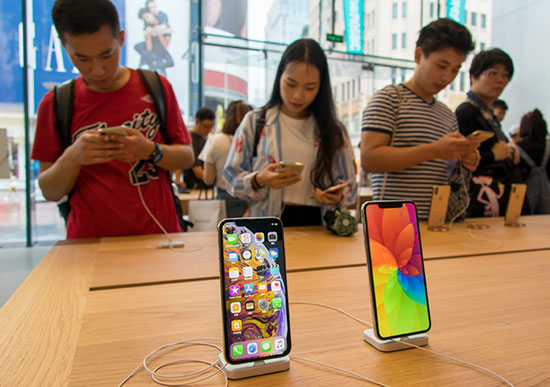


Customers select new iPhone products at the Apple flagship store in East Nanjing Road, Shanghai, on Sept 21. [Photo by Wang Gang / for China Daily]
After many Chinese online retailers slashed prices on iPhones in recent days, Apple Inc appears poised to abandon its longtime successful premium-pricing strategy and instead launch what some call a looming price war to reverse its poor sales in China.
But if the California-based company plans to bet solely on cutting prices to boost its sales in the world's largest and increasingly competitive smartphone market, it is entering uncharted waters that will likely lead to nowhere as cost performance is what its Chinese rivals have mastered over the years, analysts said.
Following a rare revenue warning from Apple, citing poor demand in China, several Chinese electronics retailers including JD.com, Alibaba's Tmall and Suning.com, slashed iPhone prices by as much as 1,200 yuan ($177.53). That was a dramatic change from previous images of Chinese consumers camping outside of Apple stores overnight or paying extra to get the latest iPhone models just a little earlier than others.
Prices cuts by retailers to boost sales ahead of the Chinese lunar new year holidays are common, but the latest signs suggest that Apple was behind the moves. The Xinhua News Agency reported on Saturday that both JD.com and Suning.com confirmed that they received "official notices and authorization" from Apple.
"There is no way electronics retailers would cut their profits by this much without Apple's support," said Wang Yanhui, head of the Shanghai-based Mobile China Alliance, noting that the move is bad news for Apple. "This means Apple's long-held pricing strategy is on shaky ground," he said.
Apple did not respond to requests for comment as of press time on Sunday. Prices of iPhones on the company's China website were unchanged.
The widespread price cuts came after Apple issued its first revenue warning in 12 years earlier this month, attributing the move to slowing demand in the Chinese market and dragging down its shares down 10 percent at one point.
The company has been falling behind some of its Chinese rivals in terms of sales in recent months. According to research firm Counterpoint, in the fourth quarter. Apple was ranked fourth in terms of market share in China, with 9 percent, well below the 23 percent held by the top vendor, Huawei Technologies Co. With innovation reaching a "bottleneck" not just at Apple but across the industry, "the only choice for Apple is to cut prices," Wang said, noting that the impact of the price cut on sales remains to be seen, "but it's not very positive."
Although the cuts were substantial by Apple's standards, its prices are still very high compared with those of many Chinese handsets, including Huawei's premium models such as the new Mate 20 series. An iPhone XR with 128 gigabytes of storage, a relatively cheap version in the latest iPhone series, could still cost 5,799 yuan, higher than the Huawei Mate 20 Pro, which is priced at 5,699 yuan.
"The biggest problem with iPhones is that they are too expensive. Before, people were willing to pay top dollar to use an iPhone because it had great technological advantages and was sort of a fashion statement. But that's no longer the case," a tech worker in Beijing, who recently bought a Huawei Mate 20 Pro, said on Sunday. "With the current climate between China and the US, it's more fashionable to use a domestic phone."
Apple's problems may run deeper than high prices, according to Fu Liang, a Beijing-based independent analyst in the telecom industry.
"With growth in the overall market slowing, or even showing no growth, Apple's strategy of mass-producing fewer models of iPhones has become difficult to pursue," Fu wrote in a note shared with the Global Times. This means Apple cannot take the lead in the adoption of the latest technologies and designs.
"If Apple does not alter its strategy, it will be hard for the company to launch high-quality and affordable 5G smartphones," he said.
 Fire brigade in Shanghai holds group wedding
Fire brigade in Shanghai holds group wedding Tourists enjoy ice sculptures in Datan Town, north China
Tourists enjoy ice sculptures in Datan Town, north China Sunset scenery of Dayan Pagoda in Xi'an
Sunset scenery of Dayan Pagoda in Xi'an Tourists have fun at scenic spot in Nanlong Town, NW China
Tourists have fun at scenic spot in Nanlong Town, NW China Harbin attracts tourists by making best use of ice in winter
Harbin attracts tourists by making best use of ice in winter In pics: FIS Alpine Ski Women's World Cup Slalom
In pics: FIS Alpine Ski Women's World Cup Slalom Black-necked cranes rest at reservoir in Lhunzhub County, Lhasa
Black-necked cranes rest at reservoir in Lhunzhub County, Lhasa China's FAST telescope will be available to foreign scientists in April
China's FAST telescope will be available to foreign scientists in April "She power" plays indispensable role in poverty alleviation
"She power" plays indispensable role in poverty alleviation Top 10 world news events of People's Daily in 2020
Top 10 world news events of People's Daily in 2020 Top 10 China news events of People's Daily in 2020
Top 10 China news events of People's Daily in 2020 Top 10 media buzzwords of 2020
Top 10 media buzzwords of 2020 Year-ender:10 major tourism stories of 2020
Year-ender:10 major tourism stories of 2020 No interference in Venezuelan issues
No interference in Venezuelan issues
 Biz prepares for trade spat
Biz prepares for trade spat
 Broadcasting Continent
Broadcasting Continent Australia wins Chinese CEOs as US loses
Australia wins Chinese CEOs as US loses